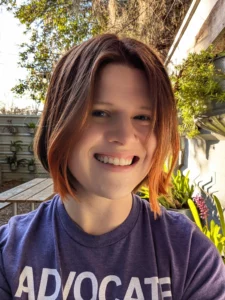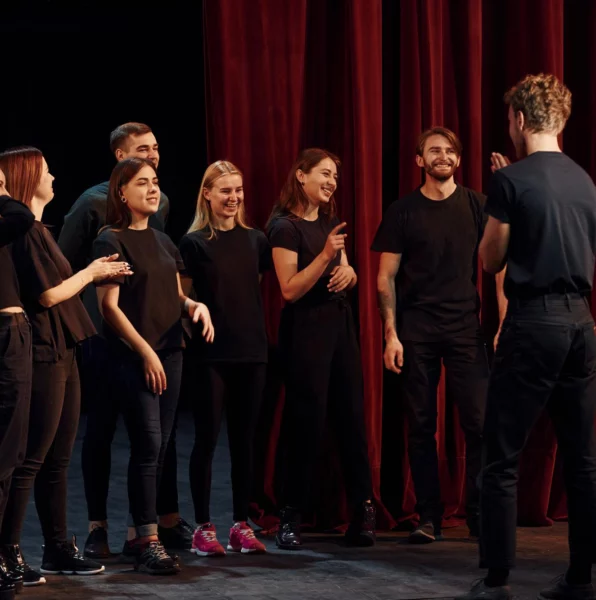Science is under attack in the USA – but two non-profit organisations are fighting back. Scientist and co-founder Samantha Goldstein explains why dialogue with and support from the public are crucial for ensuring a long-term resilience of science.
Science in the USA: “It’s not a battle, but a war”

As a PhD student in the USA, you are involved with two non-profit organisations: Stand Up for Science and Science for Good. These organisations aim to protect science from political attacks. What are your thoughts on the current political situation in the US?
I am mostly concerned, confused and frustrated because I would have expected a lot of uproar from academia regarding the targeting of science and academic freedom. But in my work with Stand Up for Science, I’ve seen that it’s mostly vulnerable people in academia who have spoken out, such as assistant professors on the tenure track, graduate students and postdoctoral researchers. They are really under attack in terms of what their careers will look like during or after these four years of Trumps administration. On the other hand, very few tenured professors have stepped up and joined us, even though they might traditionally be seen as having more power and influence.
What might be the reason for them not speaking up?
Perhaps they felt tired and apathetic after the last Trump term. They witnessed political developments under Trump’s leadership, and they took action during his first term to combat this. For example, in 2017 they joined the large-scale March for Science. Or maybe they’re just trying to protect their students. Professors with existing funding may feel that speaking out could threaten their existing funding, and therefore, their students. This is kind of what we’ve seen with certain institutions being targeted, such as Columbia, Princeton, Northwestern and Harvard. Perhaps they were passing the baton on to the younger, more energetic generation, but it’s impacting them too. I don’t think they can keep silent for much longer. I don’t think anyone can sit this out.
Your organisation is called Science for Good. What defines the ‚good‘ in science for you?
That’s a good point. We’re just trying to establish that it is a positive movement. We are not trying to only focus on ‚what’s being taken away when you attack science‘. We also want to focus on the benefits of science. Our approach is positive and non-partisan because we want to avoid alienating people. There’s a kind of double meaning in the idea that science is beneficial. Funding obviously has a heavy influence on how science is conducted, but we want to focus on the positive aspects. We have all benefited from science in some way, and being able to communicate that might be the difficult part. However, science itself — scientific enquiry, discovery and innovation — has brought us where we are today. It’s about progress.
One of the core messages of Science for Good is that ’science should serve people, not power‘. What practical steps are you taking to convince the public of this idea?
Science for Good is run by three of the original lead organisers of Stand Up for Science: Emma Courtney, JP Flores and myself. Stand Up for Science still exists as a separate organisation that focuses on direct action, mobilisation and protest, like the March for Science. However, we realise that it’s not a battle, but a war. Science must become resilient; otherwise, we’ll get through these next four years, and then you might be back here again in eight or 12 years because the underlying issue hasn’t been solved. Science needs to be sustainable across multiple governments and political parties because, traditionally, there has been bipartisan support for science funding. At the moment, however, that is not the case.
You use strong language such as ‚war‘ and ‚join the fight for science‘. Does science now have to be so resolute?
There are attacks on science, and the situation is urgent. It does feel like the negative impacts will be felt for many years to come. Realistically speaking, knowing what’s happening now in the first couple of months, I think that’s just the way it is. The long-term implications aren’t too difficult to grasp from an academic perspective. Of course, ‚war‘ is probably a strong word. I agree. But the question is, how do you make others care about that?
With Science for Good, we focus on advocacy and education. The most important practical step, we believe, is to engage with the public and gain their support. The question is, how do you communicate with them? Although we operate at a national level, it’s crucial that we secure support within communities and at a local level to bridge the gap between science and society. One concrete example is an initiative we recently launched called What’s the Big Idea?. It is our version of science open mic nights.
The idea is that you meet people where they are. You can set it up in a brewery, café or library, or wherever works for your community, and invite a few researchers. After three or four of these researchers have spoken, others are free to talk about their own research and how it is funded, as well as its impact on the community. We are still tinkering with the format and measuring the implementation and impact. Ultimately, we want to expand this initiative to less friendly environments where the stakes are higher, such as traditionally conservative groups and organisations, like VFW (Veterans of Foreign Wars), where you might encounter people who wouldn’t normally attend these events. You might encounter resistance or hecklers, but you have to be confident in the format itself. Answer questions about science in a non-judgemental way. Talk to people, don’t talk at them, and don’t assume that something is common knowledge when it’s not. The goal is to reach a common understanding of science. We support scientists in this endeavour by offering workshops and guidelines.
Do you think that people in the USA are more interested in science now due to recent political developments?
I’ve noticed that the public are realising that attacks on science are also attacks on democracy. So perhaps people view science as part of a broader umbrella of democracy, even if they’re not automatically interested in what’s happening to it. Some recent surveys show that people generally believe in science. Therefore, we don’t necessarily need to gain more trust, but rather more political influence. To achieve this, we need the public’s support. The difficult part is overcoming the barriers of misinformation. I think this has a lot to do with trust and our relationship with scientists. Many people see scientists as inaccessible. Perhaps scientists have not traditionally done a good enough job of communicating their work in a way that is less jargon-heavy.
As a communication strategy you recommend to highlight the economic value of science. Isn’t it risky to argue that science is valuable purely in economic terms, especially when many research efforts may never generate a financial return?
Yes, with this economic impact angle, perhaps it does work, but to what extent, and how can you go beyond that? There are specific types of projects that may not have financial returns that people are aware of. In any case, I think it’s important to make it clear to people that they are also affected by these attacks on science, and that their health and jobs may be in danger too. For instance, farmers benefit greatly from scientific approaches. I think that’s why communication is so important, and it takes a lot of work to figure out what might translate to different groups of people.
Here in Europe, and particularly in Germany, there is not currently a significant scientific movement. Do you think that scientists in Germany should speak out more?
Yes, because I think science will come under attack everywhere due to the large number of international partnerships. This has an impact on innovation and support within the broader scientific community worldwide. I think the USA could generally serve as a microcosm of what you might see globally. We have seen a lot of broad support from Europe, with job offers to bring scientists from the USA to Europe with promises of funding. Like they will leverage the brain drain the USA will experience with these attacks on science. It is important to take a step back and recognise that this could be a call to action, or a warning sign, because it’s better to prevent an issue than to deal with it as a direct threat.
Many scientists are afraid that activism undermines scientific credibility. Do you also see this risk?
There is definitely a risk. The risk is much higher for some than for others. I can speak from experience here: international students and scientists are at much greater risk than I am, for example, as I’m from here. I feel compelled to speak out.I wouldn’t feel good about myself if, coming from a position of privilege, I did nothing about it, even if it derailed my future career — a career that may not exist anyway if we don’t deal with the situation now. Regardless, I would rather sacrifice that for the greater good — it sounds clichéd, but it’s true.
My lab is OK for now, but some scientists have already been deeply impacted by this tumultuous situation. They had their funding terminated or lost their jobs without good reason. However, there are other ways to get involved besides protest. These include more advocacy-based ways of speaking about your research and trying to break out of the academic bubble and engage with the public. You could write an opinion editorial page or explore other avenues. However, when publishing research or writing grants, don’t automatically make yourself an accomplice to ideological attacks through self-censorshipjust because it might be cancelled. Keep your integrity. Otherwise, you are complicit in advance.






